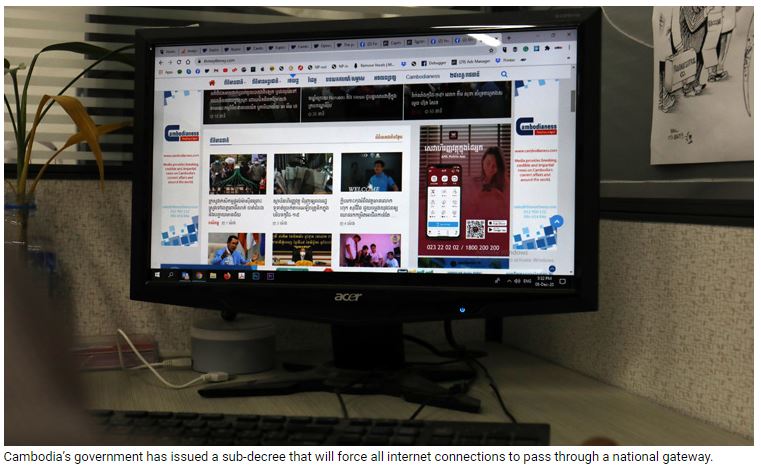Cambodia: National internet gateway given weight with sub-decree
The government issued a new sub-decree on the country’s National Internet Gateway (NIG), enabling it to singularly facilitate and manage connections domestically and internationally.
It said it will strengthen the effectiveness and efficiency of national revenue collection, protect national security and maintain social order, culture and tradition. The sub-decree was signed by Prime Minister Hun Sen and issued on Tuesday. It applies to all network and infrastructure operations and internet operations in Cambodia.
It means the Domestic Internet Exchange and International Internet Exchange of the NIG must conduct operations in Phnom Penh, Preah Sihanouk province, Poipet-Banteay Meanchey province and Bavet-Svay Rieng province as well as in some areas based on actual need and the approval from the Ministry of Posts and Telecommunications.
The NIG is hailed as a single internet gateway system to optimise network management in the country. It would create a one-stop system to bring all overseas internet connections through a single point and save costs for Cambodia’s telecom sector.
According to the sub-decree, the NIG must have operators approved by the government through the Minister of Posts and Telecommunications.
A prominent critic says it will enable the arbitrary blocking of online content.
The sub-decree states those who aim to operate the NIG must apply for a licence from the Telecommunication Regulator of Cambodia (TRC). However, terms and conditions on the procedure of applying licensing, approving licensing and the suspension and withdrawal of licensing will be conducted by the minister of Posts and Telecommunications.
“Besides the obligation set in the Telecom Law, all the internet service providers [ISPs] and concerned persons must connect or peer their network with the domestic internet exchange, which is under the supervision and operation by operators of the National Internet Gateway,” the sub-decree added.
“The connection and peering of the ISP network and concerned persons must be implemented on the exchange traffic domestically through the Domestic Internet Exchange and must accept a connection to the International Private Leased Circuit (IPLC) from overseas through the International Internet Gateway (IIG),” the sub-decree noted.
All telecom service providers that connect with the NIG’s operator must require the users of the network and telecom service to fill in a form and include an identity card to comply with the regulation.
The Ministry of Posts and Telecommunication (MPTC) and relevant institutions and authorities must cooperate to crack down on “offensive” cases related to the connection or that use cross-border internet illegally.
The sub-decree said that NIG’s operator must provide a traffic report to the Ministry of Posts and TRC monthly, quarterly, half-yearly and annually for around seven days at the end of each month, each quarter, every six months and each year.
Chea Vandeth, the minister of Post and Telecommunications, said last August during a consultative meeting with the telecom operators that the NIG sub-decree is aimed at mobilising national revenue in the sector and enhancing the effectiveness of the country’s internet connections.
Vandeth said that by approving the sub-decree, Cambodia will have a clear legal framework to govern the NIG. The minister emphasised that the connection fee would be small in order to avoid placing a further financial burden on the operators.
Thong Chenda, the newly appointed chairman of the TRC, said that the MPTC will give a clear explanation on this matter to the public. The MPTC’s administration department would not comment on the sub-decree.
However, Jeff Paine, managing director of the Asia Internet Coalition, said in a statement on Dec 8, 2020, that the sub-decree will not achieve the stated objective of enhancing the effectiveness of Cambodia’s internet connectivity.
He said what it does do is grant the government extraordinary powers to arbitrarily block online content or network connections, undermining citizens’ rights to internet access, raising grave concerns about freedom of expression, media censorship and user privacy. He added routing all international internet traffic through a single point of entry may deteriorate internet speed and increase cybersecurity risks, affecting all internet users in the country, including any Cambodian businesses that have an online presence.
“Ultimately, the government’s decision to deny its citizens alternatives for a global internet connection will potentially depress innovation, dampen foreign investment and significantly blunt the growth of Cambodia’s nascent digital economy,” Paine said.
Source: https://www.khmertimeskh.com/50815330/national-internet-gateway-given-weight-with-sub-decree/


 English
English




